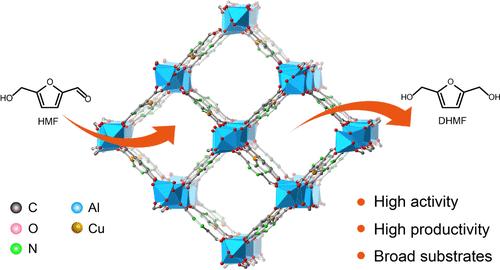Chelation and Stabilization of Dynamic Single- Atom Cu in Metal–Organic Frameworks for Selective Hydrogenation Reactions
IF 13.1
1区 化学
Q1 CHEMISTRY, PHYSICAL
引用次数: 0
Abstract
Selective hydrogenation of unsaturated carbonyl compounds into alcohols is of great importance in the fine chemical industry. Herein, we reported a robust and reusable single-atom Cu catalyst, Cu1@MOF-303, fabricated by a covalent attachment of Cu atoms to the adjacent pair of unsaturated N atoms from two neighboring organic ligands in a metal–organic framework for the selective hydrogenation of aldehydes/ketones, exhibiting high activity with complete conversion and 95% selectivity accompanied by a high product formation rate of 23.6 h–1. A combination of experimental and theoretical studies revealed that the distinctive electronic and structural attributes rendered Cu1@MOF-303 capable of adsorbing targeted functional groups in reactants and desorbing desired products preferentially due to the atomically dispersed Cu species chelated and stabilized by N atoms as well as the dynamic changes by breaking the interfacial Cu–N bonds on reactant adsorption and making these bonds on product desorption, thereby enhancing the catalytic activity and stability.

金属有机框架中动态单原子铜的螯合与稳定,用于选择性氢化反应
将不饱和羰基化合物选择性氢化成醇在精细化学工业中具有重要意义。在此,我们报道了一种稳健且可重复使用的单原子 Cu 催化剂 Cu1@MOF-303,该催化剂是通过将 Cu 原子共价连接到金属有机框架中两个相邻有机配体的相邻一对不饱和 N 原子上制成的,用于醛/酮的选择性加氢反应,具有高活性、完全转化率和 95% 的选择性,同时产物形成率高达 23.6 h-1。结合实验和理论研究发现,Cu1@MOF-303 独特的电子和结构属性使其能够吸附反应物中的目标官能团,并优先吸附所需的产物,这是由于原子分散的 Cu 物种被 N 原子螯合和稳定,以及通过在吸附反应物时断开界面 Cu-N 键和在吸附产物时生成这些键的动态变化,从而提高了催化活性和稳定性。
本文章由计算机程序翻译,如有差异,请以英文原文为准。
求助全文
约1分钟内获得全文
求助全文
来源期刊

ACS Catalysis
CHEMISTRY, PHYSICAL-
CiteScore
20.80
自引率
6.20%
发文量
1253
审稿时长
1.5 months
期刊介绍:
ACS Catalysis is an esteemed journal that publishes original research in the fields of heterogeneous catalysis, molecular catalysis, and biocatalysis. It offers broad coverage across diverse areas such as life sciences, organometallics and synthesis, photochemistry and electrochemistry, drug discovery and synthesis, materials science, environmental protection, polymer discovery and synthesis, and energy and fuels.
The scope of the journal is to showcase innovative work in various aspects of catalysis. This includes new reactions and novel synthetic approaches utilizing known catalysts, the discovery or modification of new catalysts, elucidation of catalytic mechanisms through cutting-edge investigations, practical enhancements of existing processes, as well as conceptual advances in the field. Contributions to ACS Catalysis can encompass both experimental and theoretical research focused on catalytic molecules, macromolecules, and materials that exhibit catalytic turnover.
 求助内容:
求助内容: 应助结果提醒方式:
应助结果提醒方式:


